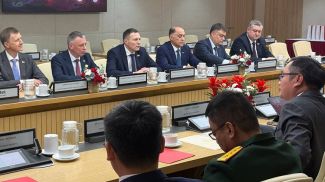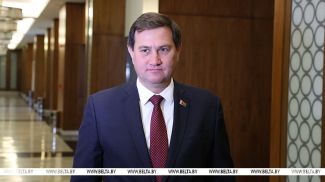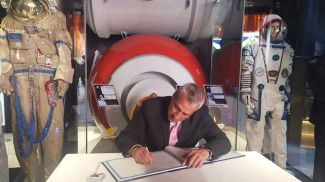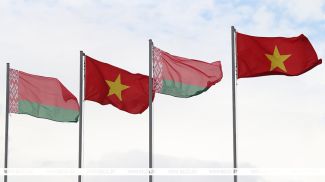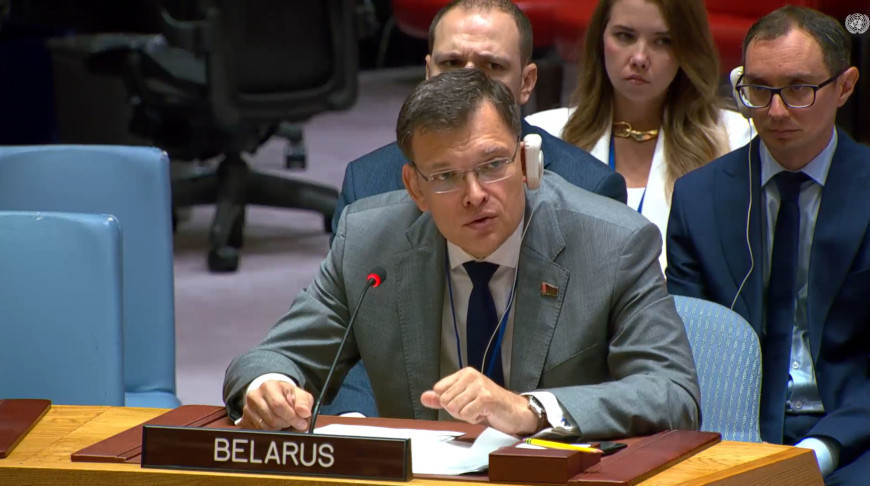
MINSK, 17 July (BelTA) – Belarusian Deputy Minister of Foreign Affairs Yuri Ambrazevich made mention of Belarus’ initiative to develop the Eurasian Charter of Diversity and Multipolarity in the 21st century as he spoke at the UN Security Council High-Level Meeting, BelTA has learned.
The meeting was focused on multilateral cooperation for a just, democratic and sustainable world order.
Yuri Ambrazevich stated the complex situation in the world, which is on the brink of World War III. “The West has failed to spearhead multilateralism as a true leader, and instead Western elites sought to maximize their own benefits to exploit others. Resistance to this has led to increased tension across the world, a rise in conflicts, a deterioration of the international security architecture, confidence-building measures, arms control, confrontation to a greater or lesser degree with a certain part of the international community and even war in Europe,” the deputy minister said. “We are witnessing not just the Western, represented by NATO, rejection of multilateralism in addressing crises, and their reliance on confrontation with those whom they have identified as competitors, adversaries and threats.”
The Belarusian diplomat mentioned a real war unleashed by Poland on the border with Belarus against migrants and the refusal to cooperate with Belarus on the matter; Lithuania's ban on the transit of Belarusian fertilizers through Lithuanian ports to Africa and Asia and Vilnius' rejection of meet Minsk's willingness to transit Ukrainian grain to the same countries; the ban of the European Union countries on air traffic with Belarus.
“Aren't the first, the second, and the third directed not only against my country, but also against the interests of a multitude of other states and ordinary people? We get an impression that with a still global involvement in the international agenda, Western states are becoming increasingly self-limited and deprived of instruments of influence. Is this not a rejection of multilateralism? The focus on unipolar action, one-sided benefits, on dictating only one's own rules - this is the root of the problems of today's world,” Yuri Ambrazevich said.
On the contrary, Eurasian countries pursue a unifying agenda through various regional associations, including the Shanghai Cooperation Organization, CIS, EAEU, ASEAN and a number of other regional associations. “These associations do not act against anyone, against the West, but it has already been noted, it is the West who is unwilling to cooperate with them,” the Belarusian diplomat said.
Recognizing this situation, last year Belarus organized a high level international conference on Eurasian security, reality and prospects in a transforming world. At the meeting, Belarus launched a process of discussing the issue of building an equal and indivisible Eurasian security architecture (in addition to peacekeeping efforts to achieve the Minsk agreements, unifying initiatives to build a new security architecture in Europe called Helsinki II, and the global theme of a San Francisco-inspired security dialogue). It is revealing that an overwhelming number of Western states ignored the invitation.
“Apparently, true multilateralism will be revived among true like-minded people. During the conference, our country put forward an initiative to develop the Eurasian Charter of Diversity and Multipolarity in the 21st Century. We see it as a unifying document to establish principles of security architecture in the Eurasian space, as well as a strategic vision of multipolarity and multilateralism of the renewed system of international relations, perhaps not only in Eurasia, but around the world,” Yuri Ambrazevich said. “For us, these principles are clear evidence. They are, first of all, reliance on international law, strict observance of the principle of indivisibility of security, respect for the diversity of development paths of each state, equal cooperation of all members of the international community, increasing the role of the UN, full use of regional associations and organizations, integration mechanisms and, of course, a return to truly effective multilateral cooperation.”
The further discussion of this topic will be held at the second conference on Eurasian security slated to take place in Minsk in late October-early November 2024.
BelTA previously reported, Belarusian President Aleksandr Lukashenko also mentioned the initiative to adopt the Eurasian Charter at a meeting in the SCO Plus format in Astana on 4 July. “We believe it should be adopted at the level of heads of state,” he said.
The Belarusian initiative has previously received support from Russia at the highest level. China has also voiced its readiness to take part in the work on the document.
The meeting was focused on multilateral cooperation for a just, democratic and sustainable world order.
Yuri Ambrazevich stated the complex situation in the world, which is on the brink of World War III. “The West has failed to spearhead multilateralism as a true leader, and instead Western elites sought to maximize their own benefits to exploit others. Resistance to this has led to increased tension across the world, a rise in conflicts, a deterioration of the international security architecture, confidence-building measures, arms control, confrontation to a greater or lesser degree with a certain part of the international community and even war in Europe,” the deputy minister said. “We are witnessing not just the Western, represented by NATO, rejection of multilateralism in addressing crises, and their reliance on confrontation with those whom they have identified as competitors, adversaries and threats.”
The Belarusian diplomat mentioned a real war unleashed by Poland on the border with Belarus against migrants and the refusal to cooperate with Belarus on the matter; Lithuania's ban on the transit of Belarusian fertilizers through Lithuanian ports to Africa and Asia and Vilnius' rejection of meet Minsk's willingness to transit Ukrainian grain to the same countries; the ban of the European Union countries on air traffic with Belarus.
“Aren't the first, the second, and the third directed not only against my country, but also against the interests of a multitude of other states and ordinary people? We get an impression that with a still global involvement in the international agenda, Western states are becoming increasingly self-limited and deprived of instruments of influence. Is this not a rejection of multilateralism? The focus on unipolar action, one-sided benefits, on dictating only one's own rules - this is the root of the problems of today's world,” Yuri Ambrazevich said.
On the contrary, Eurasian countries pursue a unifying agenda through various regional associations, including the Shanghai Cooperation Organization, CIS, EAEU, ASEAN and a number of other regional associations. “These associations do not act against anyone, against the West, but it has already been noted, it is the West who is unwilling to cooperate with them,” the Belarusian diplomat said.
Recognizing this situation, last year Belarus organized a high level international conference on Eurasian security, reality and prospects in a transforming world. At the meeting, Belarus launched a process of discussing the issue of building an equal and indivisible Eurasian security architecture (in addition to peacekeeping efforts to achieve the Minsk agreements, unifying initiatives to build a new security architecture in Europe called Helsinki II, and the global theme of a San Francisco-inspired security dialogue). It is revealing that an overwhelming number of Western states ignored the invitation.
“Apparently, true multilateralism will be revived among true like-minded people. During the conference, our country put forward an initiative to develop the Eurasian Charter of Diversity and Multipolarity in the 21st Century. We see it as a unifying document to establish principles of security architecture in the Eurasian space, as well as a strategic vision of multipolarity and multilateralism of the renewed system of international relations, perhaps not only in Eurasia, but around the world,” Yuri Ambrazevich said. “For us, these principles are clear evidence. They are, first of all, reliance on international law, strict observance of the principle of indivisibility of security, respect for the diversity of development paths of each state, equal cooperation of all members of the international community, increasing the role of the UN, full use of regional associations and organizations, integration mechanisms and, of course, a return to truly effective multilateral cooperation.”
The further discussion of this topic will be held at the second conference on Eurasian security slated to take place in Minsk in late October-early November 2024.
BelTA previously reported, Belarusian President Aleksandr Lukashenko also mentioned the initiative to adopt the Eurasian Charter at a meeting in the SCO Plus format in Astana on 4 July. “We believe it should be adopted at the level of heads of state,” he said.
The Belarusian initiative has previously received support from Russia at the highest level. China has also voiced its readiness to take part in the work on the document.




